This article is the second in a series exploring gender inequality worldwide.
WASHINGTON, D.C. -- Crime rates typically drop as countries develop socially and economically, partly because their capacity to enforce laws improves and poverty declines. But Gallup data from surveys in 143 countries in 2011 suggest men and women often do not equally share the bolstered sense of security that these types of improvements bring. In many high-income countries -- including New Zealand, Malta, Italy, France, Australia, and the U.S. -- men are considerably more likely than women to say they feel safe walking alone at night in their communities.
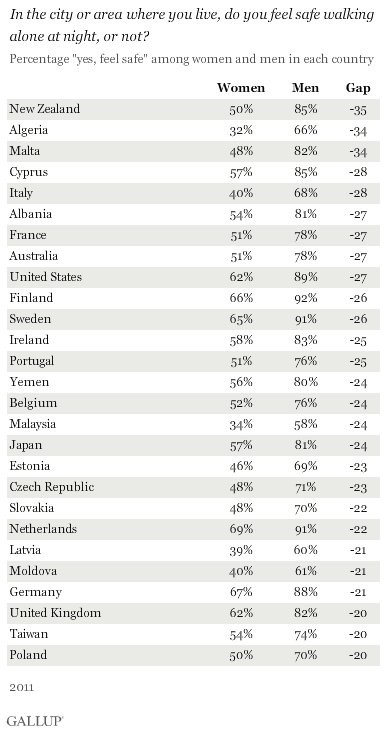
Worldwide, 72% of men and 62% of women say they feel safe walking alone in their communities at night. There were double-digit gender gaps in 84 of the 143 countries studied, with broad gender disparities most common among high-income and upper middle-income countries. The implication is that as countries develop socially and economically, expectations of physical security become the norm for all citizens -- but in many cases women are less likely than men to feel those expectations are being met.
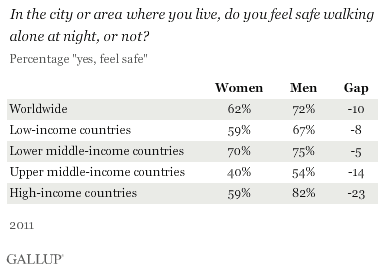
The pronounced gender gap in Europe, the global region with the greatest share of high-income countries, further supports this implication. Among all European countries studied, three-fourths of men (75%) said they felt safe walking alone at night, vs. slightly more than half of women (55%). There is also a large gap among former Soviet Union countries, the global region in which women are least likely to say they feel safe.
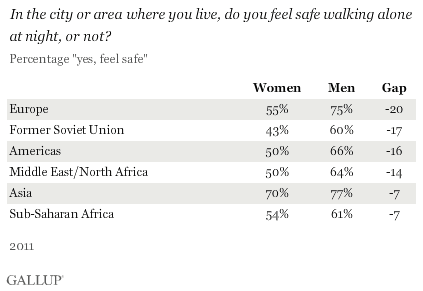
Gender gaps in perceptions of physical safety point to underlying social issues that economic progress and better policing often fail to adequately address. Violence against women remains a problem in many developed countries, and the perpetrators often go unpunished. A 2011 United Nations report rated New Zealand as one of the worst countries for domestic violence among 22 developed nations. Similarly, in January 2012, U.N. human rights expert Rashida Manjoo called on Italy to urgently address legal and structural issues that facilitate violence against women. Even in Scandinavian countries, where overall well-being scores are among the world's highest, violence against women remains a problem. Sweden, for example, has the highest incidence of reported rape in Europe.
Algeria is an example of a country in which perceptions of men and women have diverged significantly in recent years. The percentage of Algerian men who feel safe walking alone at night rose substantially to two-thirds (66%) in 2011 from less than half (47%) in 2009; however, the percentage among women has remained stagnant at about one-third.
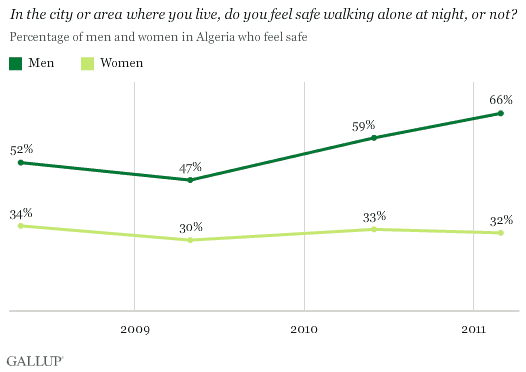
Countries Where Women Are Most -- and Least -- Likely to Feel Safe
Gender gaps aside, the countries in which women are most likely to feel secure walking alone at night include a mix of developed and developing countries. Many of the countries on this list -- including Rwanda, Tajikistan, and Laos -- are authoritarian regimes in which security forces exercise a high degree of control over the population, suggesting that in some cases personal security may come at the expense of personal freedoms. Standards for personal security may also be much lower in developing than in developed countries, which helps explain why many low-income countries appear high on the list.
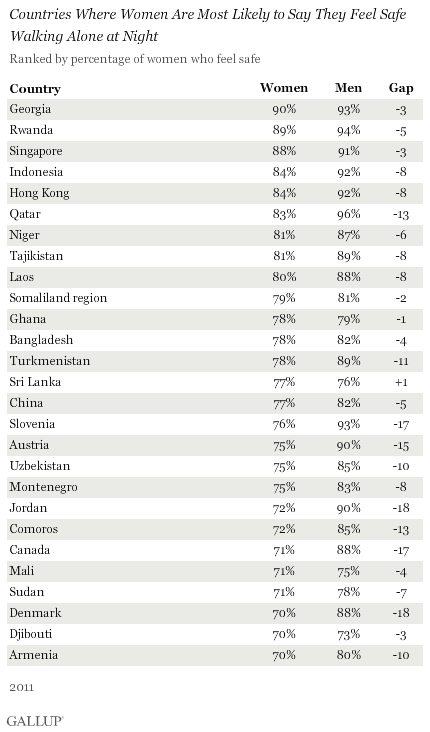
Nonetheless, several countries in which women feel most secure have made women's rights a key social priority. The Rwandan constitution mandates that women be granted at least 30% of posts in decision-making bodies including the police force. A 2005 UNICEF report states that women in the Rwandan parliament led the charge in passing laws focused on women's and children's rights. Likewise, Singapore has enacted several laws focused on protecting women in recent years, including new amendments announced in 2011 to protect female migrant workers and continue the fight against the trafficking of sex workers. In other countries, including Georgia, perceptions of safety have improved considerably among men and women in the past several years.
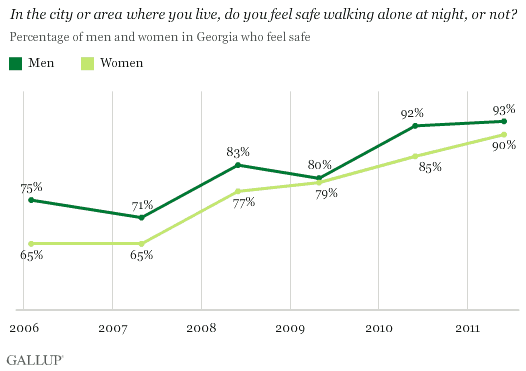
Those countries in which women are least likely to feel safe are somewhat more predictable. Gallup's finding that about one in five (21%) Afghan women feel safe walking alone at night coincides with a recent expert poll by the Thomson Reuters Foundation, which designated Afghanistan as the most dangerous country in the world for women. In several southern African countries -- including South Africa, Zimbabwe, and Lesotho -- women are particularly unlikely to feel safe. The incidence of violence against women is high in this region, particularly in South Africa, where an estimated 600,000 rapes occur every year.
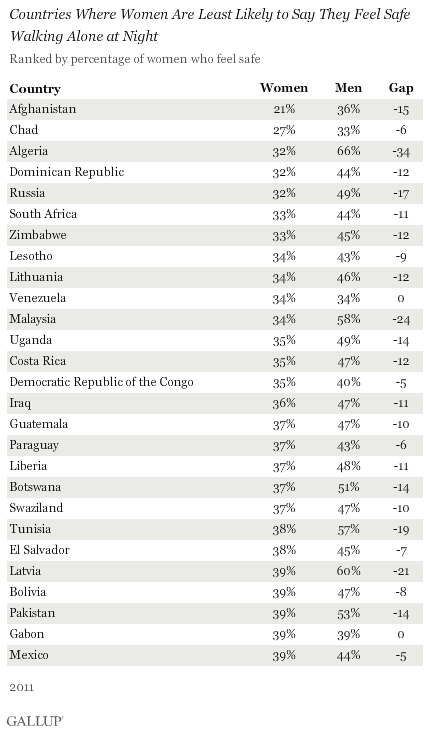
Implications
Physical security is a fundamental prerequisite for women's empowerment, and it is too often lacking even in the world's most highly developed regions. Devoting more resources to investigating and prosecuting violence against women may have widespread social benefits. As U.S. Secretary of State Hillary Clinton noted in a recent speech, "Studies suggest that women's physical security and higher levels of gender equality correlate with security and peacefulness of entire countries."
For complete data sets or custom research from the more than 150 countries Gallup continually surveys, please contact SocialandEconomicAnalysis@gallup.com or call 202.715.3030.
Survey Methods
Results are based on telephone and face-to-face interviews with 181,567 adults, aged 15 and older, conducted during 2011 in 143 countries. For results based on the total global sample, one can say with 95% confidence that the maximum margin of sampling error is less than ±1 percentage point. For results based on country-level samples, the margin of error ranges from a high of ±5.1 percentage points to a low of ±2.0 percentage points. All gender differences reported in the tables are significantly different. The margin of error reflects the influence of data weighting. In addition to sampling error, question wording and practical difficulties in conducting surveys can introduce error or bias into the findings of public opinion polls.
For more complete methodology and specific survey dates, please review Gallup's Country Data Set details.


